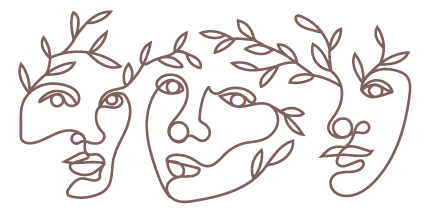The Right Side of the Bed
Illustration by Kyla Mangstat
In March, pre-pandemic-affecting-my-life, I had been feeling anxious about a falling out I had with a guy I barely even knew. So anxious, apparently, that my body could not sleep for longer than a few hours a night no matter the amount of melatonin I took. I would wake up, immediately embarrassed by the thought of [insert unremarkable thing here], and could not for the life nor sanity of me fall back asleep. By the end of March and with no digital alarm clock to blame, I had become accustomed to waking up at 5am.
To combat this, I started taking even more melatonin with the hope that it would keep me asleep. I was taking double the amount of melatonin I should have been. As a result, I had no problem falling asleep; but without fail, everyday, I was wide awake at 5am. To be clear, I should not have been taking melatonin every night, let alone double the suggested dosage. Melatonin is meant to be used by people with jet-lag for no longer than a week, and it is certainly not a cure for chronic insomnia. It only took a quick Google search for me to find that not only does melatonin have little scientific backing, it could even be harmful with prolonged use. So, what was I supposed to do? How was I to stay asleep if I could not even fall asleep to begin with?
Luckily my FBI agent and/or the YouTube algorithm worked together to recommend multiple scientific videos about getting better sleep, and they helped tremendously. Above all else, all of the videos I watched stressed the importance of regularity, that is, having a consistent sleep schedule. This was not news to me, and yet I had let it slip my mind entirely. Anyone with depression or a mood disorder, including me, can tell you that regulating your sleep has a huge impact on your overall mood and ability to self-regulate your emotions. It was April now, and lockdown had started in Vancouver by this point. As I got over my self indulgent cringe-fest, and as May approached, a new and much worse anxiety wiggled its way into my life: a pandemic, borders closing, not knowing when I would be able to see my family next (it has almost been a year), uprisings in my home city of Minneapolis (for the right reasons but scary just the same), my dog at home getting sick and dying rather suddenly. There was a lot going on, to say the least. It was hard to stay asleep. So, with the voice of sleep scientist Matt Walker in mind, I did what no night owl ever wants to do: I set an alarm for 9am.
I realized there were other routines I needed to implement. I knew that being holed up in my apartment for an uncertain amount of time meant that I was going to need to start working out regularly if I did not want my lungs to shrivel up. So, I did that too. Wake up at 9am, workout, and the logical next step: shower. Suddenly I was becoming a morning person. Suddenly I had a routine. Next came breakfast, then schoolwork or Zoom school. When classes ended, I replaced paper-writing and coding worksheets with Animal Crossing New Horizons, my new digital workplace that had a built in-routine all its own.
I was now a morning person by practice, and a person with a routine! A ROUTINE! It was exciting at first, then difficult, but after about two weeks it only got easier and easier. I started looking forward to working out in the morning because I knew it would make me feel good. I started setting my weekend alarms for 10:30, but found I was naturally waking up at 9 almost everyday- often before my alarm even went off. It didn't matter that it was early, I felt rested. Waking up became a gift- it was a brand new day, a chance to start over.
To be honest, the circumstances we are living in have only become more troubling. Besides the fires and political turmoil in the United States, in Vancouver we are still supposed to stay in our homes as much as possible, and as rainy winter begins the chances of getting outside for physical activity are only dwindling. Things feel more uncertain than ever.
There are so many things out of our control, but the things we can control can be incredibly powerful in our own lives and in getting through this time in history. I take great comfort in knowing that even if today was unproductive or painful, I have the chance to start all over again tomorrow, at the very least renewed from a good night's sleep and the comforting knowledge of how the first part of my day will go. To be human is to lose sleep over little and big things- both unnecessary cringe and warranted existential dread. Often, to be human is to be exhausted, especially now. But to be human is also to be resilient. We can and absolutely should take care of ourselves, and establishing a routine is an important part of that. So put the melatonin away, forgive yourself for silly things from the past, set your alarm, and trust that if nothing else is certain about tomorrow, you know exactly when breakfast is.

